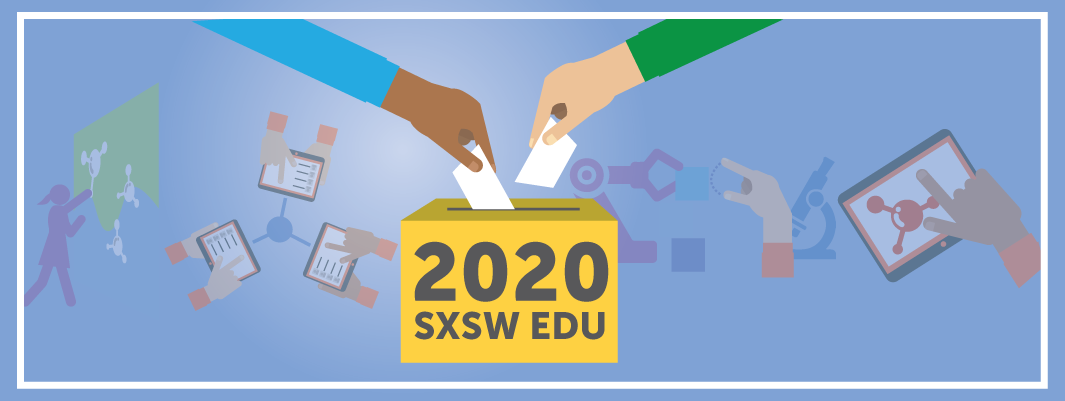
August 9, 2019 | By Erica Lawton Weinschenk
Anyone can vote for a proposed panel through SXSW’s PanelPicker, whether you plan to attend the conference or not, once you create a free PanelPicker account.
Take a look below at our proposed sessions, as well as proposed sessions from members of our HP Teaching Fellows program. Click each link that interests you to vote now through August 23, 2019.
In 2013, the majority of schools across the country were not equipped to implement an innovative and technology-rich curriculum. Today, with more than 97 percent of school districts with increased access to high-speed Internet, technology is taking hold and creating incredible learning opportunities for our students. Join EducationSuperHighway, Future Ready, and Digital Promise to discuss how the classroom is transforming for students and teachers.
To achieve educational equity by addressing learner variability, we need to blend AI (artificial intelligence) with HI (human intelligence) through data. Combining AI and HI maximizes how educators can personalize instruction and empower learners to help them reach their full potential. We will discuss and define terms including personalized learning, whole child frameworks, and equity in school. The panel will include a lively debate among varied experts and will encourage audience participation through polling and discussion.
The Digital Learning Gap is wide and elusive. Despite billions of dollars invested in innovative practices and tools, we see little-to-no improvement in the outcomes for marginalized students. Inclusive Innovation focuses on designing models that achieve equity by engaging marginalized populations in creating solutions—as leaders, participants, and beneficiaries. Learn how Inclusive Innovation is informing district equity approaches and changing teaching and learning practices.
Schools and community partners struggle to identify, implement, and sustain partnerships that provide all students with real-world learning opportunities. Five League of Innovative Schools districts co-designed a solution that supports district leaders in designing a real-world learning program and helps teachers create and implement authentic opportunities that are connected to skills, content, and competencies. Learn about these tools and how districts are using them.
“Challenge Collaboratives” are a model of research-practice partnerships that engage educators and researchers across contexts and geographies to create outputs and outcomes that benefit schools nationwide. Digital Promise has run five Challenge Collaboratives to date, addressing diverse objectives while adhering to common principles of engagement: co-design at the intersections to iterate rapidly, scale intentionally, and make an impact. Join us to learn more about the next gen of education R&D.
Against a backdrop of growing interest in learning coding as an economic driver and computational thinking as a new literacy, this panel discussion will lean into the equity challenge of realistically addressing “computing for all” in K-12 education. Leveraging timely research and real-world practices, we will address two persistent yet often overlooked questions: 1. What does “computing for all” look like in the average classroom? 2. What support is needed to ensure educational equity?
PAsmart is designed to make Pennsylvania the most prepared and talented workforce in the country by helping businesses succeed, growing the middle class, and strengthening the economy. Led by the governor of Pennsylvania, PAsmart includes partnerships with private industry and schools to strategically invest in science and technology education by increasing on-the-job training for computer science (CS)/STEM careers.
We’ll share this emerging initiative through one of the PAsmart projects. Diverse perspectives from the PA Department of Education, school leaders, and educational researchers will be explored as we discuss plans to increase equitable participation in CS, particularly among girls and students of color, by focusing on collaborative problem-solving and on gauging key competencies in computer science.
HP Teaching Fellows Proposed Sessions
This session is grounded in the idea that powerful learning is learning that lasts. This session focuses on Challenge Based Learning (CBL) and how to integrate it into the classroom to provide those powerful learning experiences for students. We will discuss the CBL framework laid out by Digital Promise and share firsthand knowledge and experience to show ways it can be incorporated into any lesson.
The panelists will discuss the projects their students completed as a part of the United Nations Sustainable Development Goals, and how they motivated their students to care about those around them. A lively discussion about how students from multiple geographic locations and culturally diverse areas could work together to make a difference is their respective communities. Attendees will walk away with insight into how to help students care about others.
Our world is 3D; why aren’t our stories? Traditional stories rely on 2D technologies like paper or images. However, new technologies allow us to not only tell stories in multi-dimensional ways but also experience the creator’s perspective through their eyes. In this interactive workshop, we will introduce 3D digital storytelling in a variety of mediums, including 360 video and photogrammetry/game design. Participants will also experiment with these technologies to tell their own stories.
Participants will explore pedagogical practices by focusing on students’ self-management of social-emotional outbursts and problematic biases. Through the metacognitive practices, the students will be able to demonstrate perseverance, develop empathy, and consider other perspectives. As students develop interpersonal and intrapersonal collaborative skills, they co-construct a respectful learning community valuing all voices.
Sign up for our Action Report newsletter to learn about other Digital Promise-related conferences and events throughout the year.
By Lauren McMahon and Heather Dowd